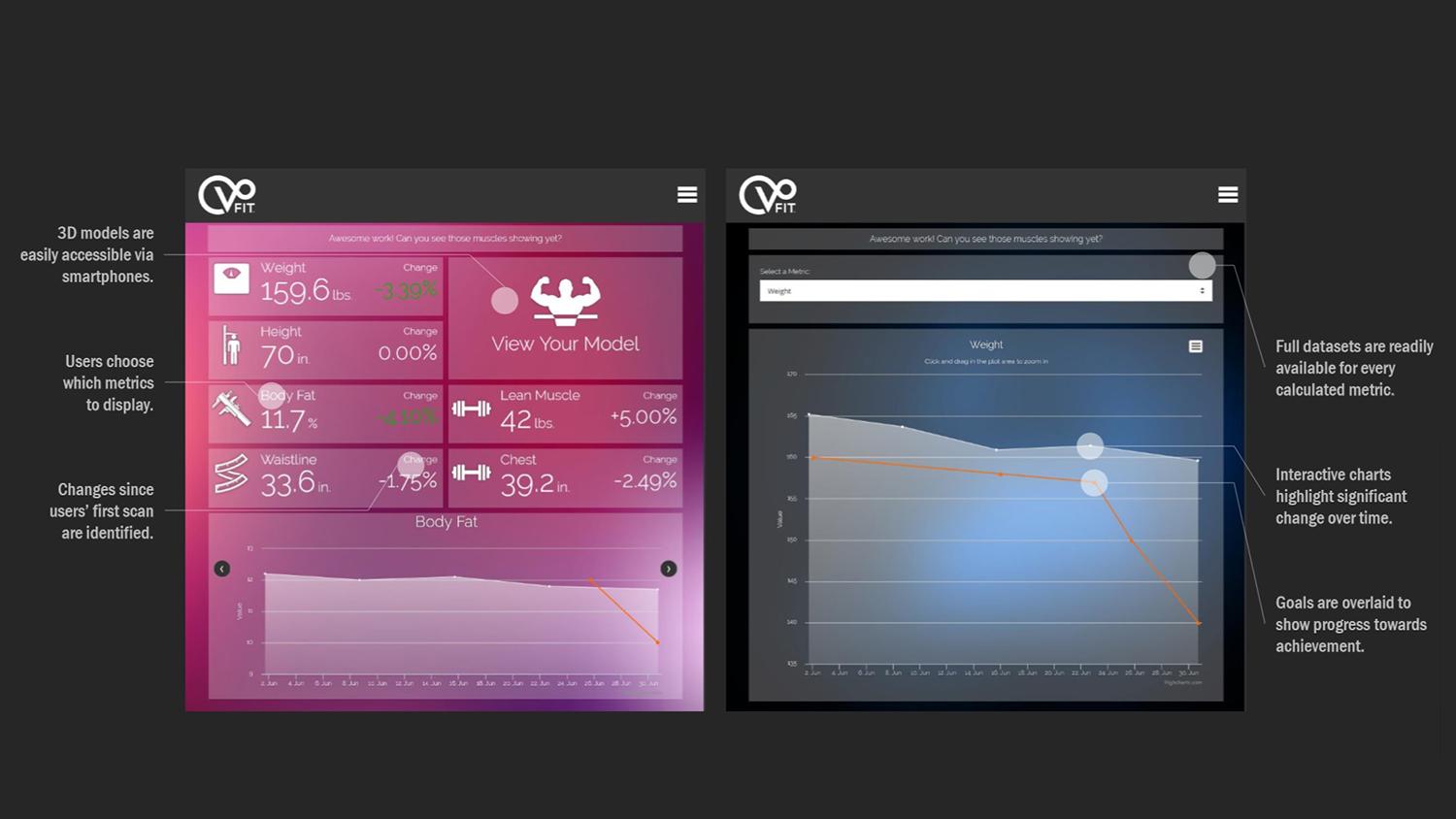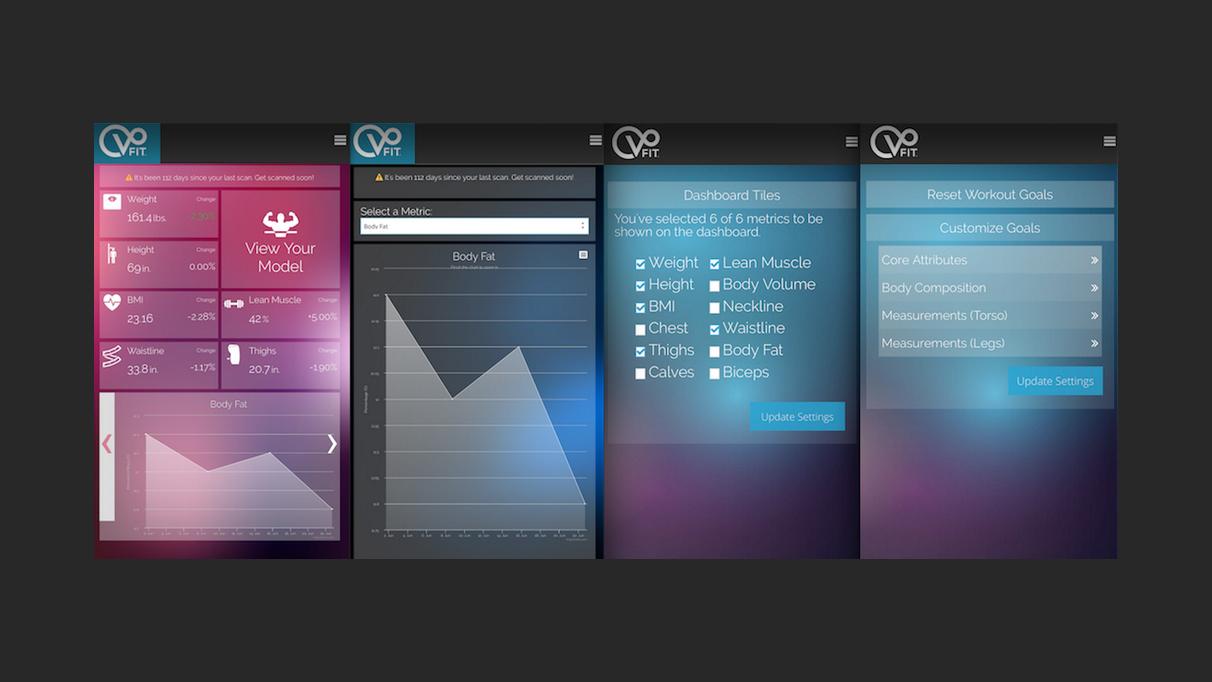
More than not, a first-time customer fails to see the kind of visible changes that might reaffirm their commitment. “I can do it,” devolves into “why bother” and a return to the land of the couch potato and sand in face.
“There are a ton of applications and many of them will really alter the way we think of 3D space.”
Enter VirtualU, which believes it has the technology to keep these goals in perspective. Built by a core of recent Virginia Tech grads (and drop-outs) with a particular interest in 3D imaging technology, VFit — which debuts at Body Smith Gym in Washington D.C. on January 10 — looks like a dressing room.
It may instead house the future.
“People say, ‘I’m working out every day, how come I’m not losing weight?” says Caroline Pugh, the 20-something co-founder of VirtualU. “We will eventually show you how you are gaining muscle and losing fat. The whole point here is to show not only that are you are on track but make sure you are motivated.”
VFit is a 600-pound phone booth of sorts, with a series of lasers and cameras positioned to capture thousands of images of an individual’s body over a span of just 15 seconds. Pugh and her team, which includes co-founder Louis Cirillo and chief technology officer Nick Graber, hope to install them in more fitness centers up and down the East Coast, at a rate of about five scanners a month.

The photos taken in the booth are transformed into some 24 million data points, or tiny dots about a millimeter apart. Taken together, they render a realistic image with all of a person’s biometrics, including weight, height, body mass, and muscle mass. The information will be updated each time the individual comes into the booth and saved on VirtualU’s cloud servers. Users will be able to track their progress from their mobile devices and share with their personal trainer.
“Since we are taking a lot of data points we can show you very easily how you are changing. We can show you if your bicep diameter has changed by as little as a millimeter from week one to week two,” Pugh, who studied business information technology at Virginia Tech, told Digital Trends.
“In three to five years we aim to dramatically decrease the churn rate of fitness centers.”
“This has been one of the most stressful but most rewarding things I’ve ever done before,” she said.
The company isn’t just selling a product – VirtualU has taken 3-D scanning to a new plateau, she said. At first, the students saw opportunity in retail – selling a 3D scanner that would fit into dressing rooms at clothing stores to help customers see how clothes would look on them. Eventually, users would be able to take those scans online to do virtual shopping, that would help retailers cut down on returns and inspire better-informed shoppers. They realized that existing scanners cost between $50,000 and $250,000 and weren’t as accurate as they needed to be, capturing only a half million to a million data points on the body for reference.
So pooling the know-how of their fellow engineering and computer science classmates, they built their own. After a quarter-million dollars and multiple prototypes, they decided to focus on software, and building out the hardware as inexpensively as possible. What they came up with is a machine that will cost less than $5,000 with what Cirillo calls “superior dimensional analytics.” It takes about 40 minutes to put together for a client, with interchangeable parts each of which costs no more than $30 (not including the touch-screen monitor).
“The most rewarding part of developing our technology is the thought that our scanner has a ton of applications and many of them will really be able to alter the way we think of 3D space,” notes Graber.
Pugh and Cirillo dropped out of school two years ago when they were able to secure a first round of financing within the formidable Virginia Tech alumni network. Hardly estranged from the Blacksburg campus, they work out of stylish offices at the school’s Corporate Research Center. A more recent round of financing in April brought the crew another $625,000 and also involved top alumni investors, including Adam Rossi, who sold his own company, Platinum Solutions, for $90 million in 2010.
The future seems bright: “our goal is to make individuals smarter about their health, appearance, and e-commerce purchases,” says Cirillo. “In three to five years we aim to dramatically decrease the churn rate of fitness centers, reduce the amount of e-commerce returns and improve the speed and efficiency of health data reporting.”
For now, it’s just one gym at a time. Shane Beatty, who runs the Body Smith fitness center, which caters to the harried and hurried office culture of the nation’s capital, is excited for VFit. He said the gym had recently rebranded from a personal training facility and prides itself on creating a relaxed, non-intimidating atmosphere.
“The VFit will assist in that,” he said, noting that unlimited scans will be available to clients for as little as $9 a month.
“When you have a trainer looking at you with a measuring tape, that can be intimidating. I think people will feel comfortable stepping in to this. I think people will do the assessments more often,” guesses Beatty.
“I think it will help increase business retention and it’s certainly a unique tool that only Body Smith will have, if only for a short bit.”







